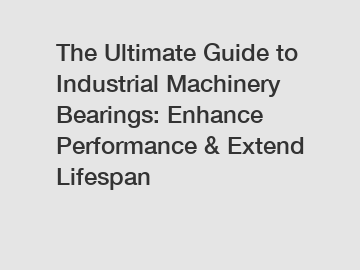The Ultimate Guide to Industrial Machinery Bearings: Enhance Performance & Extend Lifespan
The Ultimate Guide to Industrial Machinery Bearings: Enhance Performance & Extend Lifespan.
Industrial machinery bearings are an essential component in any industrial equipment or machinery. They help to reduce friction and ensure smooth operation, ultimately enhancing performance and extending the lifespan of the machinery. In this guide, we will explore everything you need to know about industrial machinery bearings, from their types to maintenance tips.
Types of Industrial Machinery Bearings.

1. Plain Bearings: Also known as bushings, plain bearings are the simplest type of bearings. They consist of a shaft rotating within a stationary bearing. This type of bearing is commonly used in applications with low speeds and heavy loads, such as conveyor belts.
2. Roller Bearings: Roller bearings are designed to handle heavy radial loads effectively. They have cylindrical, tapered, spherical, or needle-shaped rolling elements that distribute the load evenly. These bearings are commonly used in automobile wheels, conveyor rollers, and machine tool spindles.
3. Ball Bearings: Ball bearings are the most common type of bearings used in industrial machinery. They have spherical rolling elements, which allow for both radial and axial loads. Ball bearings are versatile and can be found in various applications, ranging from electric motors to pumps and compressors.
4. Thrust Bearings: Thrust bearings are specifically designed to handle axial loads. They come in various types, such as ball thrust bearings, roller thrust bearings, and tapered roller thrust bearings. These bearings are commonly used in applications with high axial loads, such as gearboxes and automotive transmissions.
Maintenance Tips for Industrial Machinery Bearings.
Proper maintenance is crucial for ensuring the performance and longevity of industrial machinery bearings. Here are some essential tips to keep in mind:
1. Lubrication: Regular lubrication is essential to minimize friction and reduce wear. Ensure you use the correct lubricant specified by the manufacturer and follow the recommended maintenance schedule.
2. Contamination Prevention: Industrial environments often contain dust, dirt, and other contaminants that can damage bearings. Use proper seals or protective covers to prevent these contaminants from entering the bearing.
3. Monitoring and Inspections: Regularly monitor the condition of the bearings and inspect for any signs of wear, such as unusual noise or vibration. Timely detection of issues can prevent further damage and potential machinery breakdown.
4. Correct Installation: Proper installation is critical for the optimal performance of industrial machinery bearings. Follow the manufacturer's guidelines and use the recommended tools for installation.
5. Replacements: Bearings have a limited lifespan and will eventually need replacement. Keep track of the recommended replacement intervals and ensure timely replacements to prevent unexpected failures.
Conclusion.
In conclusion, industrial machinery bearings play a vital role in enhancing the performance and extending the lifespan of industrial equipment. Understanding the different types of bearings and implementing proper maintenance practices can result in improved machinery efficiency and reduced downtime.
If you have any further questions or require assistance with industrial machinery bearings, do not hesitate to contact us. Our team of experts is here to help you find the right bearings and provide guidance on maintenance and replacements.
Contact us to discuss your requirements of Railway vehicle self-aligning ball bearings, custom balll bearing, Heavy machinery self-aligning ball bearings. Our experienced sales team can help you identify the options that best suit your needs.

Comments
0